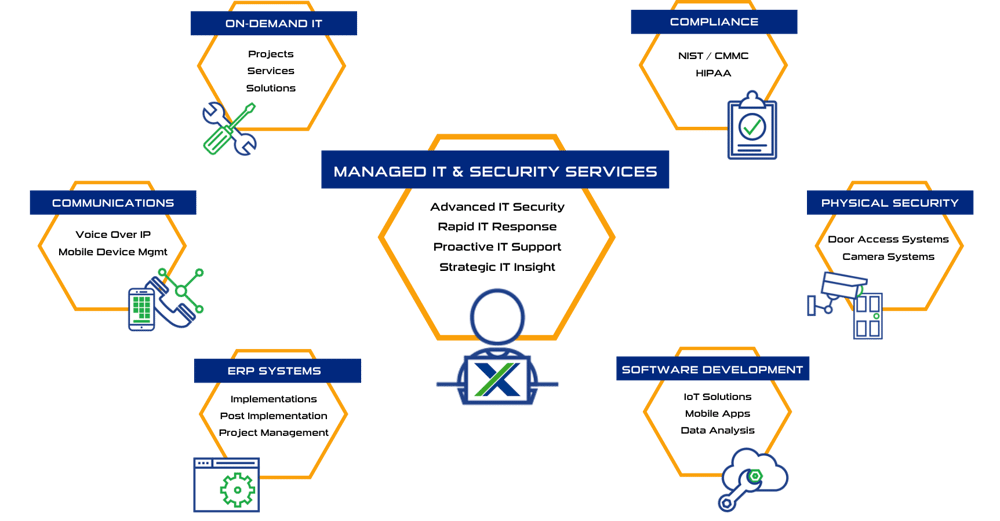Real-time Awareness
You’re always in the know about what’s happening in your digital ecosystem.
You’re the captain of your own ship. Your crew, a team of hardworking employees, rely on your vessel’s technology to help navigate the stormy waters of business. Everything seems calm on the surface right now, and you’re cruising along smoothly… but beneath the waves, danger lurks.

But oh boy, are you in for a surprise! One day, out of the blue, a massive digital kraken (let’s call it a cyber attack) emerges from the depths of the internet. It tentacles its way into your ship’s systems, causing havoc. Chaos ensues! Your navigation goes haywire, communications are down, and your cargo – sensitive data – starts leaking like a broken faucet.
Your crew, those loyal employees, are left scrambling. Customers are unhappy, and your reputation takes a nosedive. You find yourself in a real-life IT disaster movie. Why did this happen? It’s simple. You took a reactive approach to monitoring your network and its devices. You didn’t keep an eye on the radar, and you didn’t have a lookout watching for danger. You were sailing blind, and you hit that cyber-kraken head-on.
Have you ever been caught off guard by a tech disaster? Have you experienced the chaos of downtime or a security breach? If so, you’re not alone.
Cyber attacks are a daily reality for businesses big and small. Cyber criminals are constantly on the lookout for vulnerabilities.
Proactive monitoring is like having a trusty lookout perched high in the crow’s nest of your ship, scanning the horizon for any signs of danger. It’s about staying one step ahead of trouble and preventing issues before they become full-blown crises.
Your network and devices are the lifeblood of your business. They help you communicate with your team and your customers, and they store your valuable data. If any of these systems were to fail or be compromised, it would be a disaster for your business.
Proactive monitoring can spot unusual activity or potential security breaches before they become catastrophic.
When your systems go down, it can cost you time, money, and customers. Proactive monitoring helps identify and address issues before they lead to downtime.
Repairing a small leak is far less costly than trying to salvage a sunken ship. Proactive monitoring can save you money by addressing problems when they’re manageable, rather than waiting for a catastrophic failure.
Proactive monitoring ensures your systems are running at peak performance. It can help identify areas where you can optimize your technology to boost efficiency.
Knowing that your systems are being watched over gives you peace of mind. You can focus on steering your business toward success, rather than worrying about lurking threats.
Confused about the differences between proactive and reactive monitoring? They might sound like two sides of the same coin, but they’re as different as smooth sailing and a shipwreck.
Think of proactive monitoring as having a trusty lookout, ready to act at the first sign of trouble. This vigilant crew member isn’t just watching the waves; they’re actively scanning for any hint of a storm forming on the horizon.
Proactive monitoring goes beyond just keeping an eye on things. It’s about setting up automated systems and alerts that can detect anomalies and potential issues before they become crises. For instance, if your network starts to experience a spike in traffic, that could indicate a DDoS attack (Distributed Denial of Service, where your system is crippled by a flood of traffic), proactive monitoring will alert you immediately. You can then take action to defend your network before it’s overwhelmed.
On the other hand, reactive monitoring is like having a crew member who might occasionally wake up to check the horizon, but they’re not actively watching for trouble.
Reactive monitoring relies on periodic checks or manual interventions. It’s like only checking your systems when you remember to, rather than having constant, real-time awareness. This approach leaves your business vulnerable to threats that might go undetected for days or even weeks. Imagine a scenario where your email server suddenly crashes due to an overload of incoming messages. With reactive monitoring, you might not notice until your customers start complaining about missed emails. By then, you’re already in damage control mode.

You’re always in the know about what’s happening in your digital ecosystem.
When trouble is detected, proactive monitoring can trigger automated responses or alert your IT team, allowing for swift action.
Proactive monitoring keeps your systems running smoothly, ensuring your business operations remain efficient and uninterrupted.
Proactive monitoring keeps your systems running smoothly, ensuring your business operations remain efficient and uninterrupted.
Now that you understand how proactive monitoring can keep your business better protected,
it’s time to discover how it can also boost your business’s bottom line:
By identifying and addressing potential issues before they become costly catastrophes, proactive monitoring helps you save a pretty penny.
For instance, it can detect hardware failures or impending system crashes, allowing you to replace or repair them before they lead to expensive downtime. In the long run, these savings add up.
When your systems are sailing smoothly, your people can focus on their tasks without being constantly interrupted by technical issues. In turn, you can focus on business growth without constant interruptions from your people.
Think about it this way: your business operates more efficiently when your technology is on top form. This increased productivity translates to more profit.
Your data is valuable, and proactive monitoring acts as your guardian, protecting it from cyber criminals. Detecting and thwarting security threats in real-time ensures your sensitive information stays safe and secure.
Remember the cyber-kraken we talked about in the introduction? Proactive monitoring is like having a fleet of digital cannons ready to repel such threats, keeping your treasure chest locked tight.
Smooth sailing for your business means happier customers. When your systems are reliable, your team can provide top-notch service, and your customers will sing your praises.
Customer satisfaction is worth its weight in gold. Happy customers are more likely to return to your business and recommend it to others, leading to increased revenue.
Staying ahead of the competition is crucial. Proactive monitoring gives you an edge by ensuring your technology is always up to date and operating at peak performance.
So, now you understand why proactive monitoring is a crucial part of any successful business, it’s time to make a plan. And I know, that sounds like a technical nightmare, but don’t worry, you don’t need to be a tech wizard to get it right. Here are some simple steps to help you get started…
Every successful business needs a capable team, and setting up proactive monitoring is no different. You’ll need to gather a trusted team who can help you implement and manage the monitoring system. If you’re already working with a trusted IT support partner, they should already be doing this for you. If you’re not, we’d love to help.
As with everything else in your business, it’s essential to set clear objectives. What do you want to achieve with proactive monitoring? Do you want to enhance security, reduce downtime, or improve system performance? Having well-defined goals will guide your efforts and help you measure success.
You’ll need the appropriate monitoring tools for your business. These can vary depending on your specific needs, but they generally include network monitoring software, security software, and hardware monitoring solutions. Your IT support partner can help you select the best tools for your goals.
Once you have your tools in hand, it’s time to configure and implement them. This may sound daunting, but remember, your IT team is there to assist. These tools often come with user-friendly interfaces that allow you to set up monitoring parameters, define alerts, and establish automated responses.
With your monitoring system in place, you’re all set. Regularly check the data and alerts generated by your monitoring tools. When issues arise, address them promptly. Over time, you’ll refine your monitoring strategy, making it even more effective.
Your employees play a vital role in this journey. They need to be aware of the importance of proactive monitoring and how it affects their day-to-day tasks. Provide training and resources to ensure they know how to respond to alerts or potential threats.
The world of technology is ever-changing. Stay informed about the latest threats, vulnerabilities, and best practices in proactive monitoring. Attend industry conferences, read tech blogs… or let us do all of that for you.
Have Questions? Let's Chat!
Some of Our Capabilities

Systems X provides IT solutions and strategic IT guidance with a human touch. Our purpose is to empower you to make better decisions with high-quality data and world-class service. Our creative thinking and purpose-driven solutions are the fundamental gears to guide the strategy that will connect your business with what’s next!!
Sales: (586) 884-7835
Service Desk: (586) 991-1050
Managed Services in Chesterfield, MI
50801 E. Russell Schmidt Blvd, Chesterfield, MI 48051
Managed IT Services in Detroit
400 Renaissance Center Suite 2600 - #2073, Detroit, MI 48243
Managed IT Services in Ann Arbor
2723 S State St Suite 150 - #1690, Ann Arbor, MI 48104
Managed IT Services in Cleveland
1300 Superior Ave #3413, Cleveland, OH 44114
DUNS No.: 79-009-7088
CAGE Code: 8YVR5
NAICS Codes: 541511, 541512, 541513, 541519, 517911, 611420
© 2026 Systems X Corporation